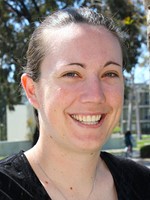

50 Free Critical Media Literacy Activities To Empower and Inspire Civic Engagement |
Listen and learn : Snapshot
Snapshots are a pairing of two 20 minute presentations followed by a 5 minute Q & A.
This is presentation 1 of 2, scroll down to see more details.
Other presentations in this group:
Dr. Allison Butler Dr. Torrey Trust Chenyang Xu| Audience: | Curriculum/district specialists, Library media specialists, Teachers |
| Skill level: | Beginner |
| Attendee devices: | Devices useful |
| Attendee device specification: | Smartphone: iOS, Windows, Android Laptop: Chromebook, Mac, PC Tablet: Android, iOS, Windows |
| Participant accounts, software and other materials: | Attendees will need access to this free eBook which they can download as a PDF before the session: https://edtechbooks.org/mediaandciviclearning |
| Topic: | Digital citizenship |
| Grade level: | PK-12 |
| Subject area: | Language arts, Social studies |
| ISTE Standards: | For Educators: Citizen
|
| Additional detail: | ISTE author presentation |
By the end of the session, attendees will be able to: 1) Identify 3 critical media literacy activities to incorporate into their practice during the upcoming school year; 2) Explain how to design a critical media literacy activity; 3) Discuss how media literacy can be embedded into social studies and language arts topics; 4) Explain why critical media literacy/production skills are essential for today's learners.
Presentation will begin with a 10-minute choice board activity. Participants will be given the opportunity to select one critical media literacy activity from a choice board to try out on their own. Then, the presenters will do a 15-minute mini lecture about the design of the free open access eBook "Critical Media Literacy and Civic Learning" and showcase the 50+ critical media literacy activities inside. In the final 5 minutes, participants will be asked to identify 3 different activities from the eBook to incorporate into their practice, 3 questions they have for the presentations, and 3 insights/ideas they want to share. This will be posted on a collaborative Padlet, which allows everyone to learn together and the presenters to respond to questions after the brief 30 minute snapshot session ends.
Scholarly works that introduce and apply media literacy:
Buckingham, D. (2003). Media education: Literacy, learning and contemporary culture. London, England: Polity Press.
Buckingham, D. (2007). Beyond technology: Children’s learning in the age of digital culture. London, England: Polity Press.
Buckingham, D. (2019). The media education manifesto. London, England: Polity Press.
Scholarly work with news analysis component:
Higdon, N. (2020). The anatomy of fake news: A critical news literacy education. Oakland, CA: University of California Press.
Young adult work on how to make sense of fake news:
Otis, C.L. (2020). True or false: A C.I.A. analyst’s guide to spotting fake news. New York, NY: Feiwel and Friends.

Allison Butler is a Senior Lecturer, Director of Undergraduate Advising, and the Director of the Media Literacy Certificate Program in the Department of Communication at the University of Massachusetts Amherst where she teaches courses on critical media literacy and representations of education in the media. Butler co-directs the grassroots organization, Mass Media Literacy (www.massmedialiteracy.org), focused on teacher education in critical media literacy. She is the author of Educating media literacy: The need for teacher education in critical media literacy (Brill, 2020) and Key scholarship in media literacy: David Buckingham (Brill, 2021).

Torrey Trust, Ph.D. is an Associate Professor of Learning Technology in the Department of Teacher Education and Curriculum Studies in the College of Education at the University of Massachusetts Amherst. Dr. Trust served as an ISTE PLN leader for five years, including a two-year term as the President of the Teacher Education Network from 2016-2018. In 2018, Dr. Trust was selected as one of the six recipients worldwide for the ISTE Making IT Happen Award, which “honors outstanding educators and leaders who demonstrate extraordinary commitment, leadership, courage and persistence in improving digital learning opportunities for students.”

Chenyang Xu is a doctoral student in the Math, Science, and Learning Technology program in the College of Education at the University of Massachusetts Amherst. He received his Master of Digital Sciences degree in 2019, and Master of Education degree in 2015. His research interests focus on utilizing social media and data science to support higher education and international student services.
Addressing Social and Emotional Learning Through Digital Citizenship
Investigate, Uncover and Engage: Critical Instructional Design for Deeper Learning in Any Subject
Rock the Shells with Google Classroom